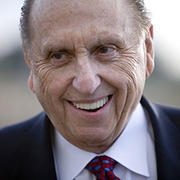
Natalie Cherie Campbell is a second year MTS candidate and a member of the Church of Jesus Christ of Latter-day Saints. She wrote this reaction piece following the January 2 passing of Thomas S. Monson, the president of the LDS church.
♦♦♦
Upon the death of the president of the Church of Jesus Christ of Latter-day Saints, the remaining 14 apostles begin a seamless system of succession. Blink and you’d miss it. So, the morning I learned President Thomas S. Monson had passed away, I was untroubled. But eventually, someone would ask me to respond.
I am a member of the LDS church, which has a conservative reputation in the United States, and I am a student at Harvard Divinity School, which is infamous for its liberal theology. I grew up in Idaho in a conservative family, but I am a progressive, left-leaning centrist living in Massachusetts. I am both devout and skeptical and try to be articulate and cheerful, but it’s difficult with the pressure of others’ expectations. I straddle two worlds. I navigate these worlds by trying to keep them apart and myself aloof from either—it's a safe but often disingenuous line.
Back home, my thoughts create emotional tension. Despite drafting, revising, praying about, and getting my husband’s feedback on what I write and say, my opinions cause waves. I’m devastated every time I fail to communicate my convictions and love, or others interpret my opinions as jeopardized belief or impassioned error. In my home culture, we’re uncomfortable if people aren’t positive enough, are too disruptive, or don’t live within our moral boundaries. Many from my Harvard community would have to hold their breath to exist there. We believe we are people of good will, yet we criticize or even demonize those who don’t agree with us.
While my Harvard world is not as emotionally charged as my world back home, it is as strategically fraught. Our active attempts to live pluralistically are praiseworthy, but our efforts fall short when being openly conservative is unacceptable. Many from my home community would have to hold their breath to exist here. We at HDS believe we are people of acceptance and awareness, yet our basic assumptions are informed by a liberal political majority that pushes preferred ideology and then calls it common ground. Frankly, it’s just like back home.
At home, I’m an outsider because I believe that civic engagement is complex, crucial, and that oversimplifying complicated issues, isolating oneself in the Church, or charging in with a bludgeon of doctrine is damaging. But, I’m a foreigner at HDS because the community’s basic assumptions disapprove of and discount the ideology of my home. I’m both inside and outside each world, so when my church’s leadership transition became a topic of discussion, I took a deep breath, planted my feet, and practiced my responses.
First, I created a mildly moving tribute to President Monson while addressing concerns about the controversial New York Times obituary. But it missed the mark. Choosing a different tack,I created a long, but inaccessible, piece explaining our system of succession and power distribution. I wanted to address assumptions about what should change in my church. But it still wasn’t right. Then I realized that this process demonstrates what it is like for me to experience religious transition while straddling two worlds.
I appreciate most of the systems in my church, but I understand why people become dissatisfied. For example, the First Presidency and Quorum of the Twelve Apostles are an all-male gerontocracy. As a young woman, this is supposed to bother me, and I know that my contentment seems obeisant to an oppressive system. But, I don’t see it that way. Change can and may need to happen, but if my leaders say no, I believe they genuinely prayed for and continue to pray for answers and share what they received from God. That’s not the blind belief of the oppressed; that’s the genuine faith of the self-aware.
The church also has a hierarchical but diffuse organizational system built on a belief in God’s ultimate governance of the church and the solidity of His doctrines. This does not encourage fast or significant change, and as a social progressive, I know this is supposed to bother me. But, I believe that the apostles are called to represent God’s will despite their fallibility, and that God has a plan. This makes me seem hypocritical, wanting too little or too much change, depending on who’s judging. But my worlds don’t have to be mutually exclusive.
The LDS church has begun a transition that will culminate this April when we sustain our leaders at General Conference. President Nelson will have a different leadership style. But President Monson’s legacy will continue as we aid refugees and all others in need. The policy changes of his tenure will not be suddenly revoked. But, regardless of what will or won’t change, I believe that God leads my church and that He will help me navigate my different worlds. That will never change, so I breathe easily.
—by Natalie Cherie Campbell
